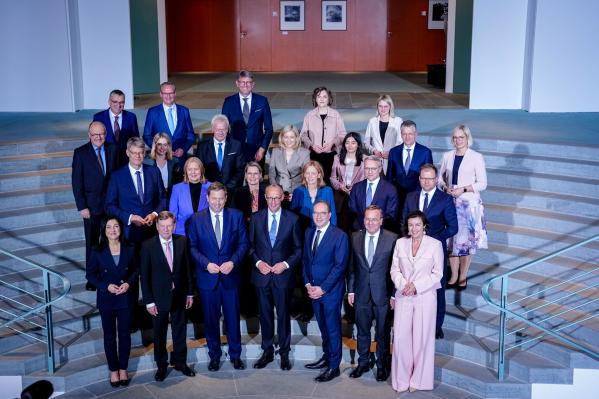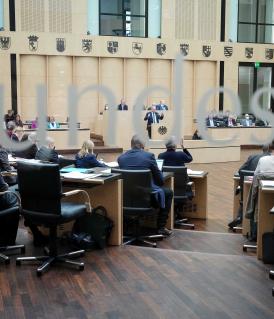How does Germany’s Federal Government operate?

The Federal Chancellor Federal chancellor The Federal Chancellor is the only member of the Federal Government to be elected. The constitution empowers him to personally choose his ministers, who head the most important political authorities. Moreover it is the Chancellor who determines the number of ministries and their responsibilities… Read more › is the head of the Federal Government Federal Government The Federal Government and cabinet is made up of the Federal Chancellor and the Federal Ministers. While the Chancellor holds the power to issue directives, the ministers have departmental powers, meaning that they independently run their respective ministries in the framework of those directives… Read more › . Together with the federal ministers, he or she forms the Federal Government, the cabinet. Alongside the chancellor’s power to determine policy guidelines, the principle of ministerial autonomy applies, according to which the ministers conduct the affairs of their departments independently within the limits of the policy guidelines set by the Federal Chancellor, as does the principle of collegiate responsibility, which states that the Federal Government decides on contentious issues by means of a majority vote.
How many federal ministers does the German government have?
The number of ministers is not stipulated in the Basic Law. Ministers may also be replaced during the course of a legislative period.
Since May 2025, the Federal Cabinet has comprised Federal Chancellor Federal chancellor The Federal Chancellor is the only member of the Federal Government to be elected. The constitution empowers him to personally choose his ministers, who head the most important political authorities. Moreover it is the Chancellor who determines the number of ministries and their responsibilities… Read more › Friedrich Merz , 16 ministers and the head of the Federal Chancellery. The federal ministries are the most senior federal authorities in each department.
Where is the official seat of the German government?
The German capital Berlin is the seat of government. Before German reunification in 1990, the capital was Bonn. In June 1991, the Bundestag The Bundestag The Bundestag is made up of the elected representatives of the German people. In principle elections to the Bundestag are proportionally representative, with each party’s share of the vote in the election reflecting the number of seats it occupies in the parliament. But the electoral system also… Read more › decided that Berlin Berlin Once a year, during the Berlinale film festival, the world of the silver screen focuses its attention on Berlin. And the city’s inhabitants are used to global interest. After all, the people of Berlin have lived in a capital city since 1458. However, there is also a shady side to the city’s history… Read more › would become the seat of parliament and government. However, six federal ministries kept their headquarters in Bonn and all ministries have offices in both cities. Bonn, as the second political centre of the Federal Republic, also bears the name of the Federal City of Bonn.
Which ministries does the German government have?
Federal Ministry of Finance
→ bundesfinanzministerium.de
Federal Ministry of the Interior
→ bmi.bund.de
Federal Foreign Office
→ diplo.de
Federal Ministry for Economic Affairs and Energy
→ bundeswirtschaftsministerium.de
Federal Ministry of Justice and Consumer Protection
→ bmj.de
Federal Ministry of Labour and Social Affairs
→ bmas.de
Federal Ministry of Defence
→ bmvg.de
Federal Ministry of Agriculture, Food and Regional Identity
→ bmel.de
Federal Ministry for Education, Family Affairs
Senior Citizens
Senior citizens
Senior citizens are not only growing older, but are healthier, fitter and more active than in the past. They are also economically better off: the over-60s hold almost a third of total purchasing power. The life style of the 50+ generation: almost one in two cares increasingly about fitness, health…
Read more ›
, Women and Youth
→ bmfsfj.de
Federal Ministry of Health
→ bundesgesundheitsministerium.de
Federal Ministry of Transport
→ bmv.de/DE/Home/home.html
Federal Ministry for the Environment, Climate Action,
Nature Conservation
Nature conservation
There are around 48,000 native animal species and over 24,000 native species of land plants, mosses, fungi, lichens and algae in Germany. Nature conservation is a state goal in the Federal Republic and is entrenched in Article 20a of the Basic Law. There are thousands of designated nature…
Read more ›
and Nuclear Safety
→ bundesumweltministerium.de
Federal Ministry of Research, Technology and Space
→ bmftr.bund.de
Federal Ministry for Economic Cooperation and Development
→ bmz.de
Federal Ministry for Housing, Urban Development and Building
→ bmwsb.bund.de
Federal Ministry for Digital Transformation and Government Modernisation
→ bmds.bund.de


